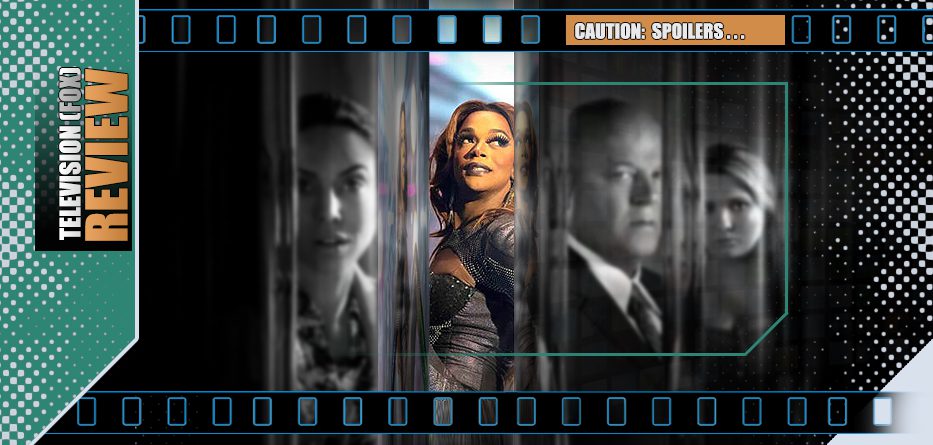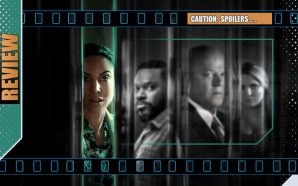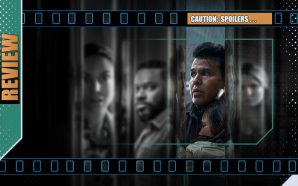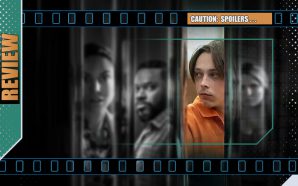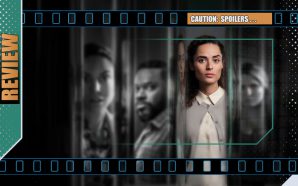Kevin is standing trial, during which they are beaten up by the brother of one of the people related to the victim. It happens in full view of one of the security officials who do little to intervene.
Flashback: Kevin is a teacher by day, but truly comes alive in the persona of Robyn Banks, a dazzling, lip-synching diva at a downtown gay burlesque bar where they are an audience-favourite. One night they are heckled by some bigoted passers-by and only narrowly miss a violent encounter. One of the group, Jamie, approaches Robyn after the rest have left and apologises for their behaviour and offers to share a ride home. Robyn is wary of a set-up, but as it’s an official Uber, eventually accepts. Robyn teases Jamie about what his real intentions may be and though Jamie initially denies any attraction, they do end up back at Robyn’s place and have a one-night stand.
Jamie, who has been raised in a household that denounces anything ‘queer’ eventually calls Robyn back, but Robyn thinks Jamie might be a ‘chaser’, the kind of person who lives a straight lifestyle to his friends and family but likes hooking up with drag-queens… and when he realises Jamie has dropped a wedding ring in the apartment, it appears he may be right. Jamie assures him it’s actually a memento of his late wife and he wants to see far more of Robyn – to which he agrees.
But despite what appears to be a growing relationship – with Kevin insisting they only meet when he’s ‘Robyn’ – Jamie becoming more and more entranced with the Robyn persona. However Kevin/Robyn spots him walking with a woman. Who is she… and how will what Robyn does next affect all their futures?
*spoilers*
Accused is a narrative deliberately tackling hot-button issues and Robyn’s Story turns out to be a solid, vivid and yet pointed entry for the series which has so far been a bit hit-and-miss in exploring the potential of its format.
Non-binary stage actor J Harrison Ghee (who won recognition for his prominent roles in productions of Mrs. Doubtfire, Kinky Boots and is currently on Broadway with Some Like it Hot) is a total delight to watch, able to handle both the scenes where he is a more quiet and introverted teacher ‘Kevin’ and the full-on diva ‘Robyn’ they become during their regular nightclub tenure. The night-club scenes are full of vitality and choreography that shows the lights and greasepaint confidence of those in front of and behind the camera. The episode is directed by the award-winning Billy Porter who drew on real life-experiences to work with show-runner Howard Gordon on the story and his experience as a black, gay man who managed to turn what he was told was a ‘liability’ into his own ‘superpower’, ultimately becoming the first openly gay Black man to win the Emmy for lead actor in a drama series (Pose). Even in a story about the collision between confidence and shame, it’s confidence that wins out as the credits roll.
Actor Chris Coy, who plays Jamie, is usually seen as tough guys or bad guys in any number of guest-roles (most recently The Peripheral) and it’s quite a revelation to see him play an initially quiet and awkward person who begins to come out of their shell. The sheer joy in the scenes when he allows himself to be made-up like a drag queen has a palpable relief of tension, though his seething frustrations and anger at home have the same, but negative, power and ultimately show him to be a guy who had deep-set troubles and anger issues that likely go beyond his orientation. Coy makes us hate aspects of his character while feeling a vein of sympathy for the factors that must be in play in his head.
One of the other key factors in Accused is not initially knowing what the crime at the heart of the case is when we see the opening moments… only having a sense of dread that something is about to go wrong and that the person of the title is somehow involved – rightly or wrongly now being judged for that. We know here that Kevin’s life, delineated though it is, is heading for a collision and we only find out how and why as scenes progress. One presumes the victim is Jamie…
One could easily argue that Robyn’s Story ultimately has some broad strokes and unrealistic wish-fulfilment moments – even the key and moving testimony at the end is the kind of monologue and delivery reserved strictly for tv and films and the very case against Kevin would likely be so circumstantial as to be a longshot for the prosecution. Yet there are some undeniably powerful and key elements in the drama that puncture various prejudices (ones that have become sadly more topical in recent years as hate crimes grow). There were any number of other potential preconceptions, pitfalls and obstacles with which a lazy script could have sunk the outing and that the story actually does navigates many with aplomb. At one point it’s noted that Jamie was abused as a youngster and a suggestion that is what led to his closeted homosexuality. Kevin immediately calls that out as bs, noting that while abuse is horrible and can ruin a person’s life and self-worth, it doesn’t innately change their orientation and that in Kevin’s opinion, Jamie was born gay and has simply had a horrible life which he uses as a crutch to strengthen his denial. On the flipside we see that Kevin/Robyn was not guilty of the crime of which he’s accused (it turns out to be the murder of Jamie’s wife, not Jamie himself – the real killer), but that Kevin is not without insecurities and foibles himself. At one point Jamie points out that for all of the claims that Kevin makes about Jamie being a coward for not openly admitting his sexuality, Kevin has always chosen to meet him as Robyn, so is perhaps hypocritical about criticising how open and confident others should be in their everyday lives. It’s those nuances displayed by both characters (and also Kristen Connolly as Nancy, Jamie’s wife) that make the story quite compelling.
The court case is the anchor for all the Accused entries, though like many of the episodes, the scenes inside the court-room are often the least interesting or believable – it’s what got us there that provides the potential powerplay. In this case, what is presented as a person being framed for a crime of passion actually turns out to be saved by a lack of criminal fashion – with Kevin arriving in court for the final part of the trial (which is not going well – the circumstantial evidence seeming pretty damning to the jury) in full ‘Robyn’ regalia and pointing out to them that if he had pre-knowledge of what Jamie had done, would Kevin have really turned up in the high-heels and expensive accessories of his Robyn persona to hide the body. It’s a nice swerve, playing others’ prejudices off against them.
A well-executed and sympathetic entry that mixes great song-and-dance with a lesson in how we judge others, Robyn’s Story works and does a number on us all. It should delight the LGBTQ community for its representation but also work well with a mainstream audience…
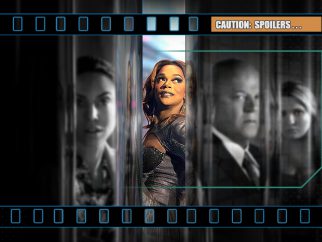
- Story8
- Acting9
- Direction9
- Production Design9

